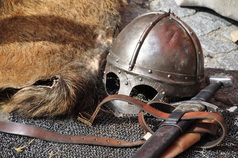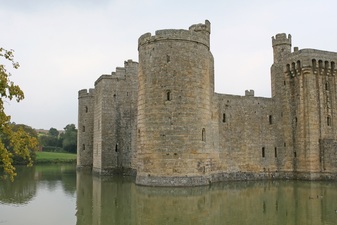 Since I enjoy history so much, I like to look at past events and think about how they affect us today. This week marks an anniversary of one of the biggies – the 950th anniversary of the Battle of Hastings, which resulted in William, the Duke of Normandy, becoming William, King of England, in 1066. There were so many things which occurred as a result of this battle, it is difficult to think of them all.  Once William was in power, he took steps to firmly establish his dominance. Castles were the most visible reminder. After he took the land away from Anglo-Saxon owners and gave it to favored Normans, he and the new nobles ensured their control by introducing and building massive stone defensive structures, some of which are still dotted about the British countryside. (And which play a prominent role in the medieval romances I love to read.) A tutorial provided by the BBC made me think of other less drastic ways the country changed. For example, something as simple as your name was a clear indicator of whether you had Anglo-Saxon or Norman origins. Very quickly, the old names like Godric or Leofric or Edith were replaced with Norman names like William (of course) or Richard or Alice. Some people gave the ingratiating names to their children; other people didn’t wait but changed their own name to something more Norman-sounding. Anglo-Saxon men had time to think about what new Norman name to choose while they were getting their hair cut. Saxon men typically had much longer hair, including facial hair. Norman men usually had shorter hair and were clean-shaven. So a Saxon man who wanted to blend in wouldn’t just change his name, he would change his look. But the Saxon man could at least console himself with a glass of wine after he lost his flowing locks. While there was always plenty of mead to drink in pre-William England, wine was not common. The Normans appreciated a good glass of wine, and it didn’t take long for wine to replace mead as the drink of choice. (Something many people today appreciate, I am sure.) Whether drinking mead or wine, people in England had many more words to use when conversing with friends over a glass. The Normans introduced thousands of words into the English language, resulting in the sometimes confusing but always interesting mix of words available today. (Something I, as a writer, can definitely appreciate.) This only brushes the surface of changes wrought in England after the Battle of Hastings, but hopefully provides food for thought. (I’ll briefly acknowledge there were also countless brutal and painful occurrences, but those are best left for another day. So many centuries have turned since 1066, it isn’t appropriate to judge what men did back then based on modern sensitivities.) When I think of the many events in the succeeding eras which have flowed from this one battle, I can only try to imagine what all of our lives would be like if the battle had never occurred.
1 Comment
8/14/2023 07:51:21 am
I wanted to express my gratitude for your insightful and engaging article. Your writing is clear and easy to follow, and I appreciated the way you presented your ideas in a thoughtful and organized manner. Your analysis was both thought-provoking and well-researched, and I enjoyed the real-life examples you used to illustrate your points. Your article has provided me with a fresh perspective on the subject matter and has inspired me to think more deeply about this topic.
Reply
Leave a Reply. |
AuthorI write historical fiction, and I invite you to share the journey to published author with me. Archives
December 2022
Categories |
 RSS Feed
RSS Feed
